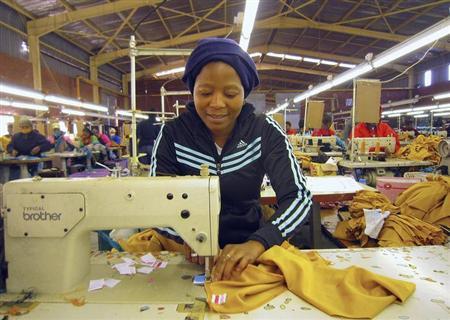Elle Magazine has produced a T-shirt bearing the legend “This is what a feminist looks like,” with proceeds going to the feminist Fawcett Society. It was modelled by Harriet Harman in the House of Commons, and outside by Ed Miliband and Nick Clegg.
Embarrassingly for Elle and the Fawcett Society, a Mail On Sunday investigation found that the workers, mostly women, producing the T-shirts were on the equivalent of 62p an hour and slept sixteen to a room with the implication they were being exploited.
Rather than making grovelling, buck passing apologies the Fawcett Society should be celebrating the freedom of women. A recent study from the free market Cato Institute suggests that “sweatshops” in the developing world are of the greatest benefit to the empowerment of women as they enjoy for the first time paid employment, better education, and have children later in life.
The Cato Institute recently looked at Bangladesh and their garment industry that began around 1980. Over the last thirty years, it has grown by 17 percent a year and accounts for 75 percent of export earnings.
The garment industry employs four million and is the first opportunity for Bangladeshi women to earn a wage other than raise a family. It requires basic numeracy and literacy to work there meaning employers and government have every incentive to educate women who comprise 80 percent of the employees. In addition, the factories encourage the supply side economics such as better roads, transport and logistics.
With the increased education, Bangladesh has surpassed the United Nations Millennium Development Goal of female enrolment. Apparently, “Bangladesh … the gender disparity favours girls.” That is more girls are educated than boys. Cato found that around the factories they were educated on average for four to five years as opposed the average of three.
Women of marriageable age (ten to twenty-three) living near factories are 17 percent more likely to have a job and 79 percent more likely to be employed where no factory exists and the result is they delay marriage and having a family.
It is not all good news, as last year a garment factory collapsed near the capital Dhaka with the loss of life of 1,021 people. However, calls for a blanket boycott would only end up punishing some of the world’s most poor. Surely, it would be better that building regulations are tightened up.
Free trade and the free market not only benefit women. The United Nations Development Programme reported in 2013 that seven hundred and fifty million mainly Chinese and Indian people have been lifted out of absolute poverty. These people earning above $1.50 a day can now afford heat, light, education and transport. The authors concluded, “Never in history have the living conditions and prospects of so many people changed so dramatically and so fast.”
While in the comfort of our own armchairs sweatshop workers seem to have a hard life compared to us, nevertheless their lives are dramatically improving. It seems that capitalism may be better for the equality of the sexes than a phalanx of misandrists.
One can conclude that if you are a feminist, buying a sweatshop T-shirt will empower more women than any trite, patronising slogan on the front.

COMMENTS
Please let us know if you're having issues with commenting.